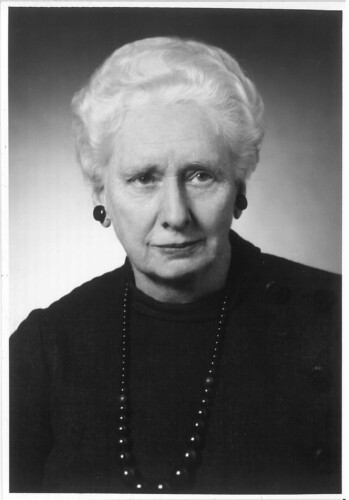New Chair in Business Law to be named after Quebec’s first woman lawyer

Elizabeth Carmichael Monk made history by becoming one of the first women called to the Quebec Bar. Her accomplished career in corporate and real estate law spanned over five decades of great social transformation. By naming a new philanthropically funded chair in business law after her, the Faculty of Law intends to honour the legacy of this pioneering alumna.
Ěý
As is often the case for trailblazers, our alumna Elizabeth Carmichael Monk, BCL’23, LLD’75, had a life of many firsts.
Her most remarkable, of course, was becoming one of the first two women ever to pass the Quebec Bar examinations and be admitted to the profession, in 1942.
But over her distinguished legal career spanning fifty-five years, she would also become the first woman to receive McGill Law’s Elizabeth Torrance Gold Medal for Outstanding Academic Achievement (1923), one of the first three women to serve on the Montreal City Council (1940), one of the first four women to appear before the Quebec Superior Court (1942), and the first Quebec woman to receive the Queen’s Counsel distinction (1955).
Monk graduated from law school at a time when women in Quebec weren’t allowed to practice law, nor to vote in provincial elections. She had come to McGill Law as a Governor General gold medalist, a Radcliffe College alumna, and having completed a one-year stint at the University of Oxford. After she received her BCL degree in 1923, she worked at a law firm as a researcher.
A few years prior, fellow McGill Law alumna Florence Seymour Bell, BCL’20, had found a creative route to circumvent Quebec’s barriers to the legal profession. Bell had joined the Bar of Nova Scotia, and used an interprovincial reciprocity agreement to practice law in Quebec. She still wasn’t allowed to make court appearances or use the title of lawyer, but was able to build a career in corporate law. Monk followed in her footsteps, joining the Nova Scotia Barristers’ Society in 1934, before returning to Montreal. In the following years, she notably served as a legal counsel for the Women’s Rights League, and criticized women’s exclusion from provincial politics.
Quand les femmes québécoises obtinrent enfin le droit de vote en 1940, Monk joignit ses efforts à ceux d’une autre diplômée de la Faculté, Annie MacDonald Langstaff, BCL’19, et plaida avec succès pour l’admission des femmes au Barreau du Québec.
En 1942, près de vingt ans après sa diplomation, elle accéda à la profession d’avocat.
Monk poursuivit toute sa vie durant une carrière juridique distinguée, pratiquant principalement le droit commercial et le droit immobilier. À l’invitation de Louis-Philippe de Grandpré, BCL’38, LLD’72 – futur juge à la Cour suprême du Canada – elle se joignit en 1966 au cabinet aujourd’hui connu sous le nom de Lavery.

L’importance du rôle qu’Elizabeth Carmichael Monk a joué pour l’avancement des droits des femmes est aujourd’hui vastement reconnue. L’Université McGill lui remit un doctorat honorifique en 1975. En 1980, elle reçut le prestigieux prix du Gouverneur général en commémoration de l'Affaire « personne », en reconnaissance de son travail pour l’égalité des femmes. Son rôle de pionnière fut de nouveau souligné en 2019, quand elle fut désignée un personnage historique par Nathalie Roy, Ministre québécoise de la Culture et des Communications.
Et son nom est sur le point de prendre une nouvelle résonnance au sein de la Faculté de droit de McGill.
On International Women’s Day 2023, the Faculty of Law announced its intent to establish the Elizabeth Carmichael Monk Chair in Business Law. Championed by McGill Law alumni David Binet, LLB’85, and Marc Barbeau, BCL’84, LLB’84, fundraising efforts are underway to permanently establish this prestigious chair.
“The Elizabeth Carmichael Monk Chair in Business Law will serve as a pillar in creating a hub of excellence in business law at McGill,” said Dean Robert Leckey, Ad E. “We will be proud to honour an alumna who so strongly exemplified core McGill Law values: academic excellence, dedication to public service, and bringing social change through legal leadership.”
Make a gift to support the
Ěý
By Karell Michaud
